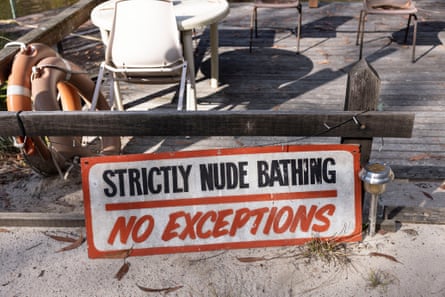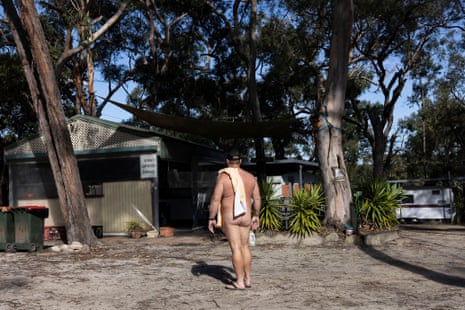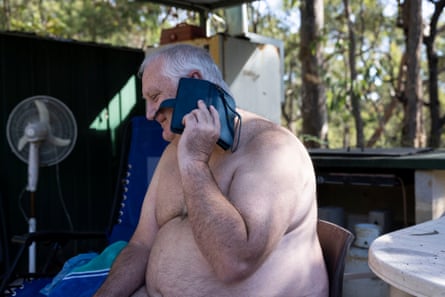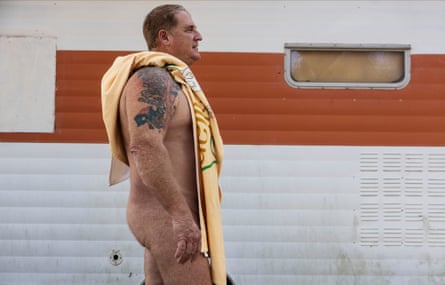“A nudist is a person who gets their gear off whenever they can,” Mick says.
“A naturist has … almost a spiritual aspect.”
Mick’s the head of the Australian Naturist Federation, which is dedicated to “normalising nudity”. Nudism and naturism are often used interchangeably to refer to non-sexual nakedness. But the way Mick tells it, it’s more of a spectrum from those who just like being nude, and those who wrap a philosophy around the practice that’s based on harmony with nature.
Nudity has, of course, always been a thing. But Mick says various waves of Scandinavian and European immigrants brought the philosophy of naturism with them.
“They believed that naturism was not just getting your gear off, it was a whole lifestyle which involved calisthenics early in the morning, no drinking … there are still people who are very strict,” he says.
“Then in the 60s and 70s, we had that whole hippy lifestyle, with people looking to rebel from the mainstream anyway, which suited the naturism thing. So we had a great big growth.”

Since then, though, the community’s growth has stalled. Mick says the advent of the internet sparked fears of people being outed and shamed. People worried their bosses or peers or loved ones would see, and judge. They worried about child custody in a country where nudity still wears a stigma.
People who fought hard to get designated nude (or “clothing optional” spaces) are now having to fight hard to keep them.
Recently, police have been cracking down on clothing optional areas – most recently in Noosa, where they’ve been issuing fines for wilful exposure to naturists at Alexandria Bay.
Queensland has no legally sanctioned nude beaches.
“It’s been an unofficial nudist beach,” one policeman reportedly said. “Now it’s officially not.”
Police said there had been complaints about lewd behaviour. Meanwhile, in New South Wales and Victoria, councils are looking at shutting down nude beaches because of complaints about indecent acts.

Mick says nudist and naturist groups have rules against indecent behaviour and would report it if they saw it. He says doing that will be harder if they themselves are seen as being on the wrong side of the law.
“[We want to] reassure people of the philosophies behind it, that it’s not a dirty dark secret, the more we do that, the more it’ll help both sides,” he says.
He is speaking to Guardian Australia from NSW’s Kiata Country Club, which bills itself as Australia’s largest nudist club.
You can visit Kiata, but there are etiquette guidelines that echo those at other nudist sites (no one seems to call them “colonies”). Take a towel (sometimes called a “bum towel”) to sit on, for hygiene reasons.
after newsletter promotion

First names only are to be used, because of that stigma.
Wash your own dishes, watch your own children and shower before using the spa or pool.
Other websites give advice on what to do if you’re nude and get an erection (it’s not meant to be a sexualised atmosphere, but if it happens, leave or hide it), or your period (you can trim a tampon string, or just wear undies, bikini bottoms or pants).
There is no coordinated campaign against nude spaces. A hodgepodge of state laws, council regulations and local contexts mean many of them just muddle along unless and until someone kicks up a fuss. So-called “textiles”, those who prefer to wear clothes, are often suspicious of those who choose to go without – despite a lack of evidence that it does any harm, and some evidence it has a positive effect on body image.
The leader of Monash University’s body image and eating disorders research group and senior clinical psychologist at Alfred Health, Associate professor Gemma Sharp, says more research is needed.

“It seems to be very positive from what I’ve read,” she says.
“I think it gives us a chance to see a range of other bodies we wouldn’t normally. We normally have curated images that we’re exposed to.
“There are certain Scandinavian countries where [being naked in] hot springs are very much the norm. Nudity across generations as well.”
Mick hopes younger generations are engaging more with body positivity (Sharp prefers “body neutrality”) and says he’s seeing that in his community. He says there’s a certain freedom from judgment that comes with walking into a room full of naked people because they are so diverse and have been stripped of symbols such as designer clothes.
“You feel free about yourself. You don’t have the same kind of hang ups. It doesn’t matter if you have a flabby tummy,” he says.
“Then combine that with laying on the beach feeling the sun on your skin.”

